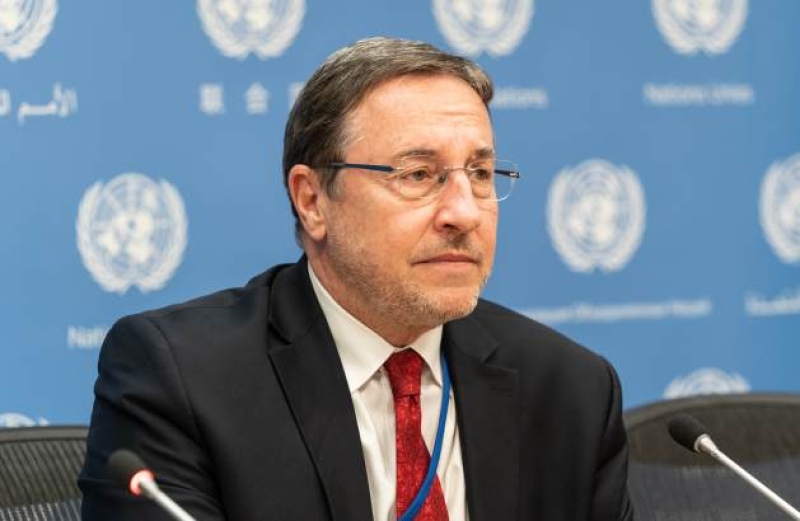- Youth participation vital to BD’s democratic future: C’wealth Group |
- Stocks retreat on week’s first trading day as turnover drops |
- Free education for girls up to honours if BNP wins: Zubaida Rahman |
- Dhaka ranks second worst in world for air pollution |
- Bangladesh stocks end week higher on upbeat mood |
Who Will Lead the UNDP Amid Global Challenges and Change?

Following Achim Steiner’s June 2025 departure, the questions loom: Who will replace him? What sort of person does UNDP need? And why does it even matter?
In June this year, UNDP bade farewell to Achim Steiner. The ninth Administrator in UNDP’s history had completed a second four-year term in office.
Who will replace him? According to our sources, several strong candidates applied for the post by the June 9 deadline. Regional consultations are now taking place to determine who will get the nod. In the meantime, UNDP’s Deputy Head, Haoliang Xu, has been serving as Acting Administrator since June 17.
The current political landscape is highly polarized, marked by increased division and negativity, both within countries and globally. This is fueled by factors such as partisan polarization among policymakers and the electorate, as well as growing public dissatisfaction with the performance of democratic and multilateral institutions. Some of this has been driven by external forces seeking to undermine democracies; some stems from bitter internal feuds and deep ideological divisions.
The Global Risks 2025 report from the World Economic Forum identified several key concerns:
Deepening geopolitical and geoeconomic tensions
A growing sense of societal fragmentation
Environmental risks – shifting from long-term concern to urgent reality
Technological risks – still partially “under the radar”
Adding to this, overseas development aid from Western countries is shrinking. Meanwhile, regional conflicts, the lasting impacts of the Covid-19 pandemic, and slowing global progress in human development present serious challenges. Against this backdrop of global uncertainty, the next UNDP leader will certainly have their work cut out.
The Qualities of a Leader: The Times They Are A-Changin’
As key decision-makers assess candidates, we hope "change management" ranks high among desired qualities. With global geopolitics in flux and UN funding under intense pressure, UNDP’s next leader must demonstrate calm under pressure, the ability to build relationships across political divides, and the skills to manage internal change as the UN tackles its funding crisis.
There is also the question of how UNDP should position itself in relation to the World Bank and regional development banks that are increasingly active in similar areas. Altogether, it's a tall order.
It is crucial that the future leader handles internal reforms effectively. UNDP’s mandate is broad—supporting countries in addressing poverty and inequality, promoting sustainable development, human rights, women’s empowerment, and democratic governance. The role spans a wide spectrum.
Technically, the UN Secretary-General makes the nomination. However, this must be confirmed by the UN General Assembly after consultation with the UNDP Executive Board.
The Board includes representatives from 36 countries who serve on a rotating basis. Current members include China, India, Brazil, Germany, Japan, the UK, and the US—powerful players who will undoubtedly have differing views on the matter.
Candidates rumored to have applied include:
Jacinda Ardern (New Zealand) – An unconfirmed rumor, but if true, the former Prime Minister would follow in the footsteps of Helen Clark, another New Zealand leader who ran UNDP from 2009–2017. Ardern is widely admired, but could her left-of-center politics be a drawback in today's polarized climate?
Alexander De Croo (Belgium) – A centrist or center-right former Prime Minister of Belgium, believed to have submitted his candidacy before the June deadline. He is seen as a serious contender.
Rebeca Grynspan (Costa Rica) – Former Vice President of Costa Rica and current Secretary-General of UNCTAD. A respected figure from Costa Rica’s social democratic party.
Izumi Nakamitsu (Japan) – A seasoned diplomat with deep UN experience, currently serving as UN Under-Secretary-General for Disarmament.
Bård Vegar Solhjell (Norway) – Reportedly nominated by Norway, Solhjell is a former Environment Minister and vocal EU critic with a background in leftist politics.
Jens Christian Wandel (Denmark) – Recently appointed Special Adviser on Reforms to the UN Secretary-General, he has broad UN experience and is involved in internal UN reform.
Chrysoula Zacharopoulou (France) – A centrist former French Minister for Development and International Partnerships, currently under consideration.
Whoever is chosen will need to hit the ground running. Success could elevate UNDP’s global influence to levels not seen since the 1990s. Failure, on the other hand, could risk the organization’s relevance—at a time when it is needed more than ever.
Prof. Felix Dodds and Chris Spence have participated in UN environmental and sustainable development negotiations since the 1990s. Their latest book, Environmental Lobbying at the United Nations: A Guide to Protecting Our Planet, was published in June 2025.

